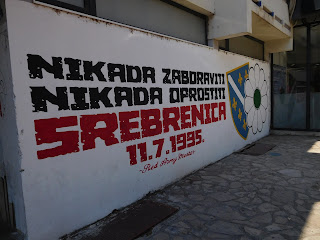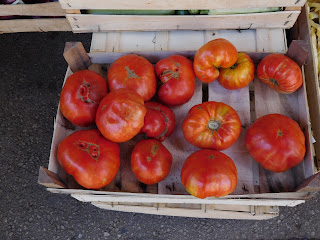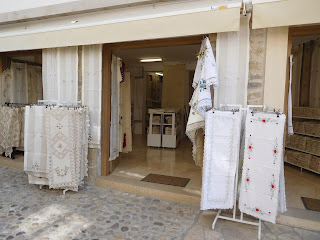(Suellen: When thinking of the title for this blog post, I was channeling you!)
After a long and very exciting day yesterday, it was nice to have a slow day planned while we spent time discovering Mostar itself. Mostar is so small or still in such a state of recovery from the war, that there was no tourist information office. Luckily, I had some travel info I brought from home so we went on our own walking tour of Mostar to discover it.
The building we climbed last night should have had this sign up!
Wish we could have seen this entire restaurant rooftop sign:
Going down was way worse than going up, especially when we met people going up at the same time.
Poster reminding people to remember the horrific events that took place in Srbrenice on 11/7/95 in which thousands of Muslims were slaughtered by the Serbians.
The Bosnian and Herzegovina flag (or at least most of it!):
The 'altar' with steps is for the Muslim cleric to lead prayers or address his congregation. Islam, however, does not follow sermon-type worship. It was unusual for us seeing the green flag like this in mosques in the former Yugoslav countries but he said they were common here. Again, Steven and I were struck how incredibly kind and welcoming the man at the mosque was. The difference between the welcome we get at mosques and from other religious places of worship has been striking.
Manuscript of the Holy Qur'an aka Koran from the 16th century:
We saw the building again we had climbed last night and wondered anew at our sanity for having done so!
There are lots of small mom and pop style grocery stores all over Mostar and indeed over much of the Balkans. These were among the biggest tomatoes I had ever seen!
Again, I ask the question: graffiti or art?
A photo of the entire BiH flag!
Photo of one of the towers overlooking Stari Most:
Walking across the bridge on these marble steps was interesting and tough!
After a long and very exciting day yesterday, it was nice to have a slow day planned while we spent time discovering Mostar itself. Mostar is so small or still in such a state of recovery from the war, that there was no tourist information office. Luckily, I had some travel info I brought from home so we went on our own walking tour of Mostar to discover it.
The building we climbed last night should have had this sign up!
The first place we stopped was at the Koski Mehmed Mosque
located in the Old Town
We bought tickets to climb to the top of the minaret because
of the beautiful views from there. The views were indeed stunning but I was not
a big fan of the 89 (Steven counted them!) very steep steps as they went round
and round the tall, narrow minaret.
So often lately, we’ve heard the call to Muslim prayer by a
muezzin as we’ve ascended towers and fortresses. It seemed almost fitting,
therefore, that this time we heard the sound of church bells pealing once atop
the minaret.
The gorgeous views of Stari Grad and Stari Most, i.e. the Old Town and Old Bridge made the long climb up the minaret well worthwhile.
Wish we could have seen this entire restaurant rooftop sign:
Going down was way worse than going up, especially when we met people going up at the same time.
Back on the street, we saw Vadim, the Russian fellow who had
been on the same tour as us yesterday and whom we had spent a lot of time with.
He posed in his best Putin look-alike pose as he said a number of people have
commented on the similarity!
The Bosnian and Herzegovina flag (or at least most of it!):
Just about two blocks further along the same main street in the Old
Town
The mosque’s ticket taker cum guide was very friendly and
talked apparently frankly as he welcomed us at his mosque. He joked that only
old men come to pray at the first of the five daily calls to prayer. The others
are still abed asleep at the initial one! He remarked how well Mostar had done
before the war compared to what is happening now. So many Bosnians have been
forced to immigrate to Canada
to find a better life for themselves, he said. He chatted about what a great
country Bosnia
is, the country’s crazy politicians and how life just goes on after the war.
We had never been in a mosque where all the carpets were
identical as they were here. When I remarked on their beauty, he said they had
been made locally.
The 'altar' with steps is for the Muslim cleric to lead prayers or address his congregation. Islam, however, does not follow sermon-type worship. It was unusual for us seeing the green flag like this in mosques in the former Yugoslav countries but he said they were common here. Again, Steven and I were struck how incredibly kind and welcoming the man at the mosque was. The difference between the welcome we get at mosques and from other religious places of worship has been striking.
Manuscript of the Holy Qur'an aka Koran from the 16th century:
He pointed out evidence of the colors the mosque had looked like prior to the war's damage.
The mosque's associated madrassa or religious school is now used as a clinic.
It was sad to see a number of female gypsies, all with children in tow, begging on the main street.
Our walk led us next to Santica Street below on the other side of the Neretva River. It was named after a famous Christian poet, Alexander Santic, who fell in love with a Muslim woman named Emina. Although he was willing to convert to Islam to win her love, her family would not allow it. One of the most traditional love songs was written in her honor. This street was the dividing line between the Croats and the Bosnian forces and saw some of the most intense fighting of the entire war.
The street looked so peaceful now of course and had a few stores and restaurants open.We saw the building again we had climbed last night and wondered anew at our sanity for having done so!
There are lots of small mom and pop style grocery stores all over Mostar and indeed over much of the Balkans. These were among the biggest tomatoes I had ever seen!
Again, I ask the question: graffiti or art?
A photo of the entire BiH flag!
We then walked through Old
Town Neretva
River Crooked
Bridge
About 20 stone bridges were constructed in BiH under the Ottoman
Empire . Twelve of them were still standing in 1992 when the civil
war broke out. The Crooked Bridge Old Bridge
The bridge collapsed on New Year’s Eve, 1999 during winter
floods but mainly because of damage inflicted on it during the 1992-95 war. In
order to preserve its original character, it was reconstructed in accordance with its appearance before 1967, respecting the bridge's environment and the changes made to it during its long history. It was rebuilt under the supervision of UNESCO and thanks to the technical and financial support of the Grand Duchy of Luxembourg of all places!
The area around Old Town and the Crooked Bridge was so incredibly charming and seemed a million miles away from the bombed out areas we had just walked through less than half an hour ago.Photo of one of the towers overlooking Stari Most:
Walking across the bridge on these marble steps was interesting and tough!
We had begin our own stroll around Mostar around 10:30 and were done shortly after 2, as there weren't museums to see. Believe me, neither of us were complaining about not having more to see as our days have been jam packed up til now.
Posted from Kotor, Montenegro on September 12th, 2016.











































The views from the minaret are mouth-watering
ReplyDelete